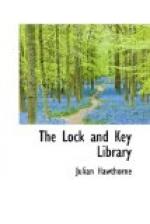Mrs. Fairbank doesn’t view the study of agricultural human nature with my relish. Her fidgety horse will not allow her a moment’s repose; she is beginning to lose her temper.
“We can’t go fourteen miles in this way,” she says. “Where is the nearest inn? Ask that brute in the field!”
I take a shilling from my pocket and hold it up in the sun. The shilling exercises magnetic virtues. The shilling draws the peasant slowly toward me from the middle of the field. I inform him that we want to put up the horses and to hire a carriage to take us back to Farleigh Hall. Where can we do that? The peasant answers (with his eye on the shilling):
“At Oonderbridge, to be zure.” (At Underbridge, to be sure.)
“Is it far to Underbridge?”
The peasant repeats, “Var to Oonderbridge?”—and laughs at the question. “Hoo-hoo-hoo!” (Underbridge is evidently close by—if we could only find it.) “Will you show us the way, my man?” “Will you gi’ oi a drap of zyder?” I courteously bend my head, and point to the shilling. The agricultural intelligence exerts itself. The peasant joins our melancholy procession. My wife is a fine woman, but he never once looks at my wife—and, more extraordinary still, he never even looks at the horses. His eyes are with his mind—and his mind is on the shilling.
We reach the top of the hill—and, behold on the other side, nestling in a valley, the shrine of our pilgrimage, the town of Underbridge! Here our guide claims his shilling, and leaves us to find out the inn for ourselves. I am constitutionally a polite man. I say “Good morning” at parting. The guide looks at me with the shilling between his teeth to make sure that it is a good one. “Marnin!” he says savagely—and turns his back on us, as if we had offended him. A curious product, this, of the growth of civilization. If I didn’t see a church spire at Underbridge, I might suppose that we had lost ourselves on a savage island.
II
Arriving at the town, we had no difficulty in finding the inn. The town is composed of one desolate street; and midway in that street stands the inn—an ancient stone building sadly out of repair. The painting on the sign-board is obliterated. The shutters over the long range of front windows are all closed. A cock and his hens are the only living creatures at the door. Plainly, this is one of the old inns of the stage-coach period, ruined by the railway. We pass through the open arched doorway, and find no one to welcome us. We advance into the stable yard behind; I assist my wife to dismount—and there we are in the position already disclosed to view at the opening of this narrative. No bell to ring. No human creature to answer when I call. I stand helpless, with the bridles of the horses in my hand. Mrs. Fairbank saunters gracefully down the length of the yard and does—what all women do, when they find themselves in a strange place. She opens every door as she passes it, and peeps in. On my side, I have just recovered my breath, I am on the point of shouting for the hostler for the third and last time, when I hear Mrs. Fairbank suddenly call to me:




